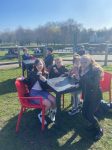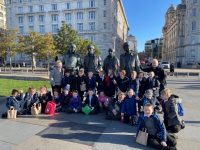Intent
Our vision for Geography at Westvale is that Geography helps to provoke and provide answers to questions about the natural and human aspects of the world. Children are encouraged to develop a greater understanding and knowledge of the world, as well as their place in it. The geography curriculum at Westvale enables children to develop knowledge and skills that are transferable to other curriculum areas and which can and are used to promote their spiritual, moral, social and cultural development. Geography is, by nature, an investigative subject, which develops and understanding of concepts, knowledge and skills.
We seek to inspire in children a curiosity and fascination about the world, including their locality , which will remain with them for the rest of their lives; to promote the children’s interest and understanding of diverse places, people, resources and natural and human environments, together with a deep understanding of the Earth’s key physical and human processes.
The curriculum is designed to develop knowledge and skills that are progressive and supported by the National Curriculum objectives, throughout their time at Westvale and also to their further education and beyond. We have identified place and location as a key concept for our children and seek to provide them with ample opportunities explore the school grounds, the local area and then a wider scale as they progress through the school. We believe that a secure understanding of maps underpins all areas of the curriculum. We have therefore introduced a mapping unit which consists of a one of lesson in each year group. This allows both opportunities for progression as well as revisiting key skills.
Implementation
Geography at Westvale is taught in weekly lessons throughout the year, so that children can achieve depth in their learning. At the beginning of each topic, children are able to convey what they know already as well as what they would like to find out. This informs the programme of study and also ensures that lessons are relevant and take account of children’s different starting points. All learning will start by revisiting prior knowledge. Each class has a working wall displaying key questions, facts and vocabulary, these are developed as the unit progresses and each lesson will begin with recapping what was taught previously. Consideration is given to how greater depth will be taught, learnt and demonstrated within each lesson, as well as how learners will be supported in line with the school’s commitment to inclusion. Cross curricular outcomes in Geography are specifically planned for, with strong links between Geography, Literacy and Maths. These are identified, planned for and utilised. The local area is fully utilised to achieve the desired outcomes, with extensive opportunities for learning outside the classroom embedded in practice. Key skills are identified for each lesson and are placed alongside the learning objective in books. These are then used to help check understanding. Weekly curriculum quizzes are used to review learning and check that children know more and remember more. Learning is reviewed also on a termly basis, after a period of forgetting, so that teachers can check whether information has been retained.
Geography assessment is ongoing throughout the relevant cross-curricular themes to inform teachers with their planning lesson activities and differentiation. Summative assessment is completed at the end of each topic where Geography objectives have been covered;
Impact
Outcomes in topic and literacy books, evidence a broad and balanced Geography curriculum and demonstrate children’s acquisition of identified key knowledge. Geography Champions are able to talk confidently about key stills taught and demonstrate a good knowledge and understanding. As children progress throughout the school, they develop a deep knowledge, understanding an appreciation of their local area and its place within the wider geographical context.
Geographical understanding, as well as children’s spiritual, moral, social and cultural development is further supported by the school’s links with local High Schools; ensuring that they are well prepared for the next steps of their education.



